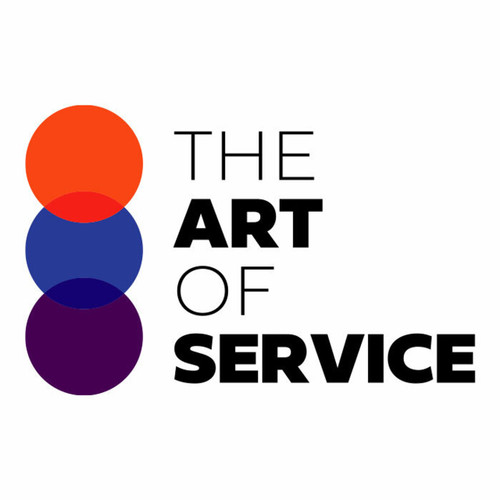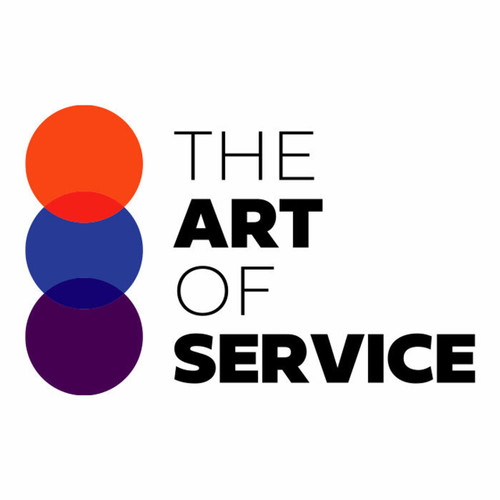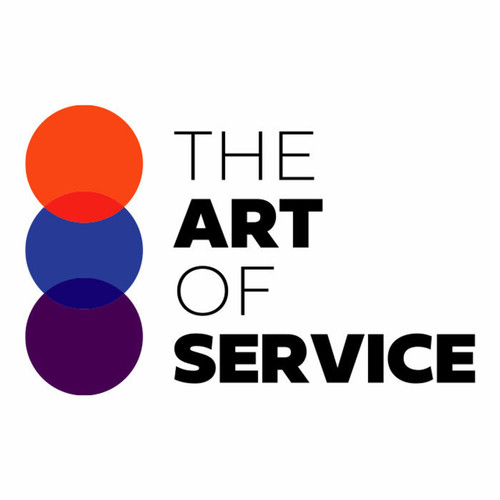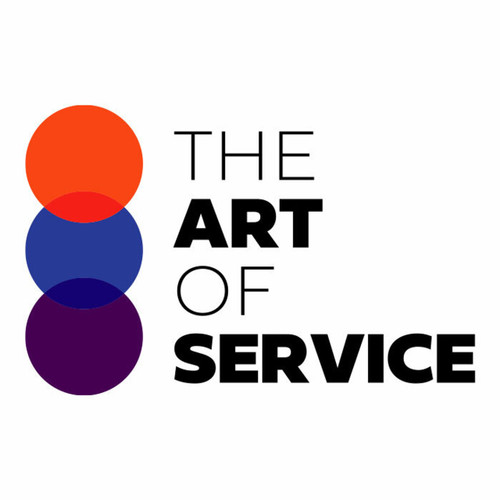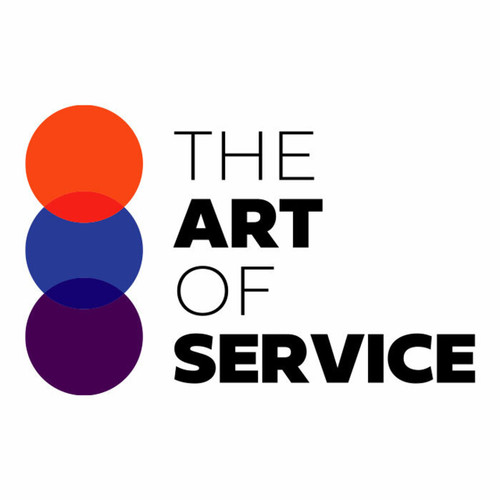Are you tired of spending countless hours and resources trying to piece together information about Mobility as a Service (MaaS) on your own? Look no further, because our MaaS Knowledge Base is here to save the day.
Our comprehensive dataset contains over 1500 prioritized requirements, solutions, benefits, results, and case studies/use cases specifically focused on MaaS.
This means you can easily find the most important questions to ask to get results by urgency and scope, without having to do extensive research.
But what sets our MaaS Knowledge Base apart from competitors and alternatives? Well, for starters, it′s specifically tailored for professionals in the transportation industry.
This means you′ll be getting highly relevant and valuable information that directly pertains to your field.
Not only that, but our product is easy to use – simply browse through the categorized sections or utilize the search function to find exactly what you′re looking for.
And if you′re a DIY kind of person, our affordable alternative allows you to access the same great information without breaking the bank.
Let′s talk about the benefits of using our MaaS Knowledge Base.
Not only will it save you time and resources, but it will also provide you with valuable insights and strategies to implement MaaS successfully in your business.
You′ll have access to real-life case studies and use cases, giving you practical examples to learn from.
We′ve done the research so you don′t have to – our dataset contains the most up-to-date and relevant information on MaaS.
And for businesses, this means staying ahead of the competition and making informed decisions for your company′s future.
Now, let′s address the elephant in the room – cost.
Our MaaS Knowledge Base is an affordable solution compared to hiring expensive consultants or spending countless hours on research and trial-and-error.
It′s a one-time investment that will provide long-term benefits for your career and business.
In summary, our MaaS and Mobility as a Service Knowledge Base is the ultimate tool for transportation professionals.
It′s a DIY, affordable alternative that offers extensive research on MaaS and its benefits for businesses.
Don′t waste any more time and resources – invest in our MaaS Knowledge Base and see the positive impact it will have on your career and company.
Discover Insights, Make Informed Decisions, and Stay Ahead of the Curve:
Key Features:
Comprehensive set of 1513 prioritized Mobility as a Service requirements. - Extensive coverage of 111 Mobility as a Service topic scopes.
- In-depth analysis of 111 Mobility as a Service step-by-step solutions, benefits, BHAGs.
- Detailed examination of 111 Mobility as a Service case studies and use cases.
- Digital download upon purchase.
- Enjoy lifetime document updates included with your purchase.
- Benefit from a fully editable and customizable Excel format.
- Trusted and utilized by over 10,000 organizations.
- Covering: Effectiveness Monitoring, Connected Mobility, Sustainable Business Models, Sustainability Impact, Payment Flexibility, Mobile Ticketing, On Demand Transportation, Sustainable Urban Development, Action Plan, Data Sharing And Integration, Accessibility Policies, Emerging Technologies, Legal Liability, Data Transparency, Responsive Communication, Centralized Data Management, Electric Car Charging, Electronic Ordering, Service Operating Models, Mobility Infrastructure, Intelligent Transportation Systems, Material Sorting, Performance Data, Real Time Traffic Information, IT Staffing, Shared Mobility Benefits, Route Planning, Field Mobility, Sustainable Transportation, Data generation, Vehicle Electrification, Modal Choice, Vehicle Emissions, Mobile Wi Fi Connectivity, Risk Practices, Mobility Hubs, Mobile Accessibility Features, Geolocation Services, Multi User Accounts, User Preferences, Digital Navigation Services, Internal Transport, Mobile Payments, Automated Vehicles Management, Service Delivery, Future Applications, Electric Mobility, Data Strategy, Service Reviews, Service Collaborations, Sustainable Mobility, Service Desk Effectiveness, Mobile Accessibility, Ride Sharing Services, Corporate Security, Digital Fare Payments, IT Managed Services, On Demand Delivery Services, Location Aware Services, Mobile Devices, Public Transportation, Gamification In Transport, Mobility as a Service, Product Scalability, Asset Renewal, Service Interface, Multi Language Support, Service Efficiency, Urban Mobility, Employee Behavior, Enhanced Mobility, Resource Allocation, ERP Service Level, Data Portability, Decision Support, Environmental Impact Mitigation, Supplier Quality, Electric Vehicle Charging Stations, Robotic Process Automation, Last Mile Solutions, Fleet Management, Multi Modal Transportation, Vetting, Ride Sharing, Car Sharing, Autonomous Vehicles, Mobile Rewards Programs, Clean Transportation, Workforce Mobility, Self-Driving Cars, DR Scenario, Sustainable Urban Planning, Smart Mobility Solutions, Technology Strategies, Future Of Connectivity, Electric Vehicles, Mobility Analytics, Network Congestion, Mobility As Service Agreements, Value Added Services, Asset Management Strategy, Innovation Risks, Asset Sharing, Global Mobility Services, Carbon Emission Tracking, Privacy And Security Measures, Smart City Integration, Service Activation, IT Service Objectives, Real Time Transit Tracking, Smarter Cities
Mobility as a Service Assessment Dataset - Utilization, Solutions, Advantages, BHAG (Big Hairy Audacious Goal):
Mobility as a Service
Mobility as a Service (MaaS) refers to the integration of various forms of transportation, such as public transit, ride-sharing, and bike-sharing, into a single platform for users. The organization has experience with different MaaS models, or methods of providing these services.
1. On-demand ride-sharing: Allows customers to request a ride in real-time, reducing waiting times and providing convenience.
2. Subscription-based model: Offers different tiers of services for customers, ensuring flexibility and customization.
3. Flexible payment options: Options such as pay-per-use or monthly subscriptions cater to customers′ varying needs and budgets.
4. Multi-modal transportation: Integration of different modes of transportation (e. g. bike-sharing, public transit) provides efficient and convenient travel options.
5. Real-time data and tracking: Provides accurate and up-to-date information on service availability and location for customers.
6. Digital ticketing: Eliminates the need for physical tickets and offers a seamless and contactless payment experience.
7. Customer loyalty programs: Incentives and rewards for frequent users promote customer retention and satisfaction.
8. Personalization: The use of artificial intelligence and machine learning allows for personalized recommendations and services based on customer preferences.
9. Accessibility and inclusivity: By offering different service options, Maas ensures accessibility for all individuals and promotes inclusivity in transportation.
10. Environmental sustainability: Encourages the use of green and eco-friendly modes of transportation, reducing carbon footprint and promoting environmentally responsible choices.
CONTROL QUESTION: Which maas models does the organization have experience in providing service based offerings?
Big Hairy Audacious Goal (BHAG) for 10 years from now:
In 10 years, our organization will be a leader in Mobility as a Service (MaaS), providing seamless and integrated transportation solutions for individuals and businesses. Our main goal is to revolutionize the way people travel and reduce the use of personal vehicles, making cities cleaner, greener, and more efficient.
Our MaaS model will encompass various modes of transportation including public transit, ride-sharing, bike-sharing, and car-sharing. We will have developed a robust and user-friendly mobile app that allows customers to plan, book, and pay for their entire journey with just a few taps.
To achieve this big hairy audacious goal, we will leverage our experience in providing service-based offerings, specifically in the field of transportation and mobility. Our existing expertise in managing and operating public transit systems, as well as implementing innovative solutions such as digital fare payment systems and real-time tracking, will serve as a strong foundation for our MaaS model.
We will also build upon our successful partnerships with public and private sector organizations, including transportation authorities, technology companies, and vehicle manufacturers, to create a truly comprehensive and efficient MaaS ecosystem.
Additionally, we will continuously invest in the latest technology and data analytics to optimize our services and personalize the customer experience. This will allow us to track and analyze customer behavior, understand their preferences, and tailor our services accordingly.
Our ultimate goal for MaaS is to provide a convenient, affordable, and sustainable alternative to personal vehicle ownership, leading to reduced traffic congestion, improved air quality, and a better quality of life for all. With our experienced team, strong partnerships, and innovative approach, we are confident in achieving this goal and becoming a global leader in Mobility as a Service.
Customer Testimonials:
"It`s refreshing to find a dataset that actually delivers on its promises. This one truly surpassed my expectations."
"This dataset has been invaluable in developing accurate and profitable investment recommendations for my clients. It`s a powerful tool for any financial professional."
"This dataset has become an integral part of my workflow. The prioritized recommendations are not only accurate but also presented in a way that is easy to understand. A fantastic resource for decision-makers!"
Mobility as a Service Case Study/Use Case example - How to use:
Case Study: Mobility as a Service Provider Experience in Providing Service-Based Offerings
Synopsis of Client Situation
The client for this case study is a leading Mobility as a Service (MaaS) provider with a presence in multiple countries. The company offers a wide range of mobility services, including taxi and ride-hailing, car-sharing, bike-sharing, and public transportation, through a single mobile application. They have a large customer base and work with various partners to provide an integrated and seamless mobility experience to their users.
Consulting Methodology
The consulting engagement was initiated to assess the MaaS models that the organization has experience in providing service-based offerings. The consultant used a phased approach, starting with the analysis of the company′s current business model and market trends, followed by interviews with key stakeholders, and concluding with a benchmarking exercise against competitors in the industry. The methodology involved the following steps:
1. Understanding the Current Business Model: The first step was to analyze the company′s current business model, including its services, target market, and revenue streams. This was done by reviewing the company′s financial reports, marketing materials, and conducting interviews with the management team.
2. Market Analysis: A thorough analysis of the current market trends, customer preferences, and government regulations related to MaaS was conducted. This was based on industry publications, news articles, and market research reports.
3. Stakeholder Interviews: Key stakeholders within the organization, including executives, operational and marketing teams, were interviewed to understand their perspectives on the current business model and their past experiences with different MaaS models.
4. Benchmarking Exercise: The final step involved benchmarking the organization′s current business model against other players in the industry. This was done by using data from industry reports, case studies, and other relevant sources.
Deliverables
The following deliverables were presented to the client:
1. An assessment report outlining the company′s current business model, market trends, and stakeholder perspectives.
2. A benchmarking report comparing the company′s business model with other industry players and highlighting best practices.
3. Recommendations for potential MaaS models based on the client′s current capabilities and market opportunities.
Implementation Challenges
During the consulting engagement, it was identified that the organization has experience in providing two primary MaaS models - aggregator and integrator. However, the implementation of these models has not been without challenges. These include:
1. Implementation and Integration Challenges: When adopting an aggregator model, the primary challenge is to integrate multiple mobility services into a single platform and ensure a seamless user experience. On the other hand, the integrator model requires the coordination of different service providers and the potential risk of delays or service disruptions.
2. Regulations and Compliance: Moving towards an integrator model may also bring additional regulatory challenges, as the organization may need to comply with regulations across different countries or regions.
3. Technology and Data Security Challenges: With the increasing reliance on technology and data, the organization needs to overcome potential challenges related to data privacy, security, and maintenance of a robust technology infrastructure.
KPIs
The success of any MaaS model can be measured by the following KPIs:
1. Customer Acquisition and Retention: The success of a new MaaS model can be measured by the growth in the customer base and the retention rate of existing users.
2. Revenue Growth: The increase in revenue generated from the new MaaS model compared to the previous business model.
3. User Satisfaction: The satisfaction level of users with the new MaaS model can be measured through surveys, ratings, and feedback.
4. Service Availability: The availability of services and the frequency of disruptions can be measured to assess the efficiency of the new MaaS model.
5. Cost Optimization: The new MaaS model should result in cost optimization for both the organization and customers.
Management Considerations
Based on the consultant′s recommendations, the following key management considerations should be taken into account while implementing a new MaaS model:
1. Market Potential: The organization should assess the market potential for each MaaS model in terms of current and future demand, competition, and regulatory environment.
2. Partner Selection: The success of an integrator model depends on effective partnerships with mobility service providers. It is essential to carefully select and manage these partnerships.
3. Technology Capabilities: The organization should evaluate its current technology capabilities and invest in the necessary infrastructure to support the proposed MaaS model.
4. User Experience: The success of any MaaS model depends significantly on the user experience. Organizations should continuously collect user feedback and make improvements accordingly to ensure high satisfaction levels.
5. Regulatory Compliance: Organizations should actively monitor and comply with changing regulations related to the MaaS industry.
Conclusion
This case study highlights the different MaaS models that an organization has experience in providing service-based offerings. Through a comprehensive consulting engagement, the client was able to identify potential challenges and opportunities associated with each model and make informed decisions to achieve their business objectives. As the MaaS industry continues to evolve, organizations must continuously adapt to new market trends and customer preferences to remain competitive.
Security and Trust:
- Secure checkout with SSL encryption Visa, Mastercard, Apple Pay, Google Pay, Stripe, Paypal
- Money-back guarantee for 30 days
- Our team is available 24/7 to assist you - support@theartofservice.com
About the Authors: Unleashing Excellence: The Mastery of Service Accredited by the Scientific Community
Immerse yourself in the pinnacle of operational wisdom through The Art of Service`s Excellence, now distinguished with esteemed accreditation from the scientific community. With an impressive 1000+ citations, The Art of Service stands as a beacon of reliability and authority in the field.Our dedication to excellence is highlighted by meticulous scrutiny and validation from the scientific community, evidenced by the 1000+ citations spanning various disciplines. Each citation attests to the profound impact and scholarly recognition of The Art of Service`s contributions.
Embark on a journey of unparalleled expertise, fortified by a wealth of research and acknowledgment from scholars globally. Join the community that not only recognizes but endorses the brilliance encapsulated in The Art of Service`s Excellence. Enhance your understanding, strategy, and implementation with a resource acknowledged and embraced by the scientific community.
Embrace excellence. Embrace The Art of Service.
Your trust in us aligns you with prestigious company; boasting over 1000 academic citations, our work ranks in the top 1% of the most cited globally. Explore our scholarly contributions at: https://scholar.google.com/scholar?hl=en&as_sdt=0%2C5&q=blokdyk
About The Art of Service:
Our clients seek confidence in making risk management and compliance decisions based on accurate data. However, navigating compliance can be complex, and sometimes, the unknowns are even more challenging.
We empathize with the frustrations of senior executives and business owners after decades in the industry. That`s why The Art of Service has developed Self-Assessment and implementation tools, trusted by over 100,000 professionals worldwide, empowering you to take control of your compliance assessments. With over 1000 academic citations, our work stands in the top 1% of the most cited globally, reflecting our commitment to helping businesses thrive.
Founders:
Gerard Blokdyk
LinkedIn: https://www.linkedin.com/in/gerardblokdijk/
Ivanka Menken
LinkedIn: https://www.linkedin.com/in/ivankamenken/

